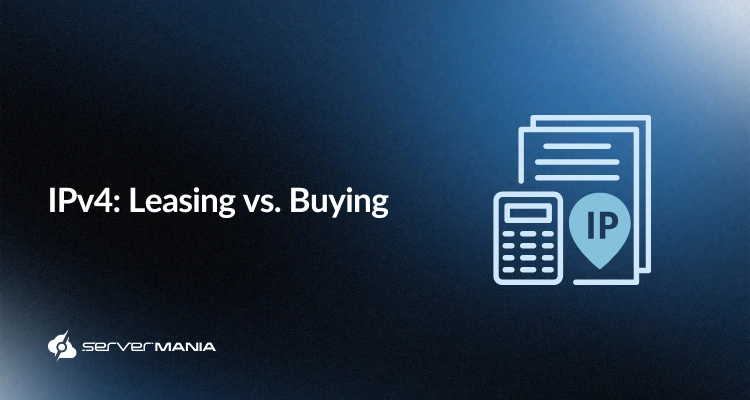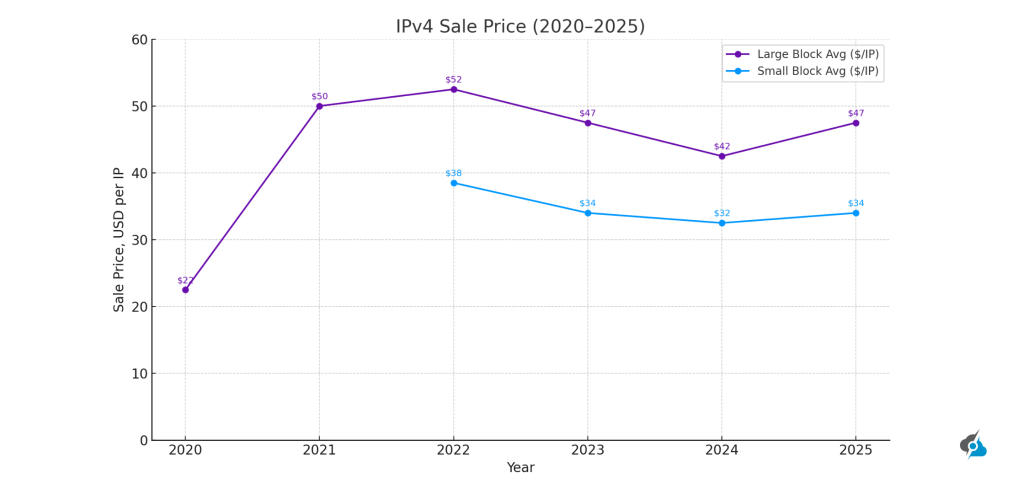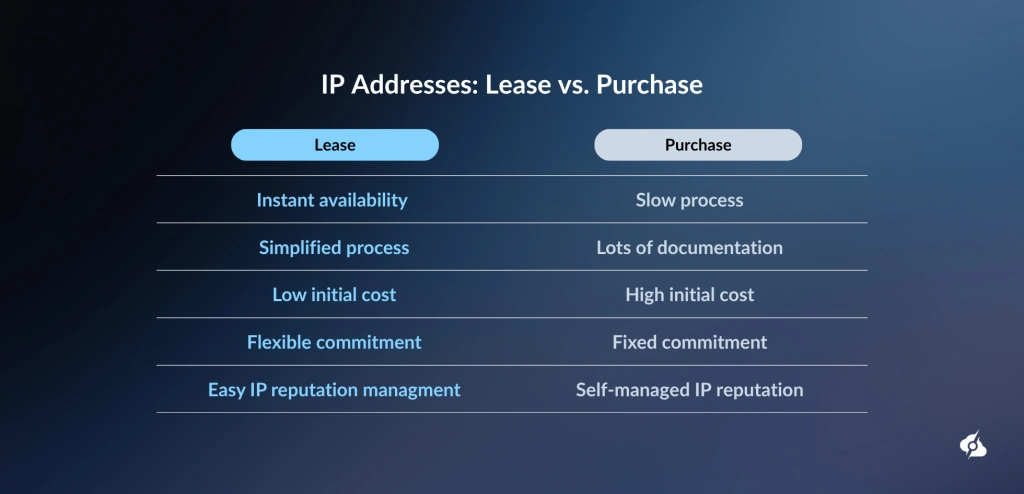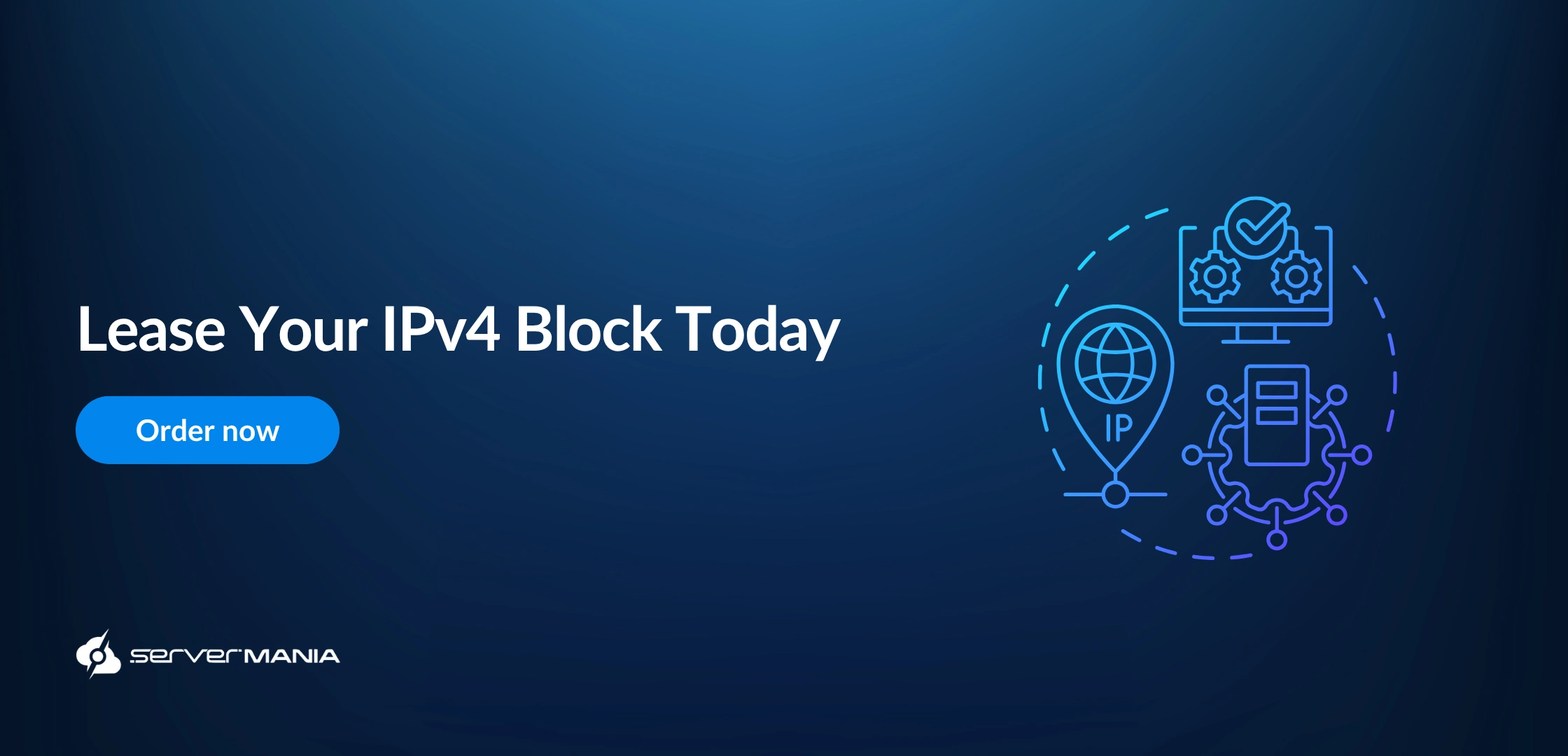IPv4 Leasing Pricing Guide: When Does Leasing Make More Sense Than Buying

In 2025, acquiring IPv4 addresses is challenging since prices are high, and the supply is becomes tighter with every year. However, ServerMania’s IP leasing process has made it simple and this quick guide will help you learn how it works, whether you should choose buying or leasing and how to calculate costs.
Starting with the most important…
IPv4 Exhaustion and Rising Costs
IPv4 address exhaustion began back in 2015, when the 4.3 billion available addresses vanished, driving the prices up ever since. Organizations requiring IPs for growth are facing higher costs every year, while prices are reaching $30–$50 per IP in 2025.
Lease Vs Buy IP Addresses
In short, leasing allows you to use IPs without the $50-per-IP purchase price, perfect for short-term needs or startups. When you purchase an IP address it provides you with an ownership but demands large upfront investment, so your choice depends on project length and budget.
For instance, buying IPs from American Registry for Internet Numbers (ARIN) requires a detailed justification, including a business plan outlining how you’ll use the requested IP space. You need to submit contact details, a detailed overview, and specifics on IP utilization, ensuring compliance with ARIN’s strict allocation rule.
ServerMania’s IP Leasing Services
ServerMania offers IP leasing services with low pricing, which delivers IPs to global organizations. So, in this quick guide we’ll unpack costs, calculations, and reveal when leasing is better for your business.
Read Also: Understanding IPV4 and How It Works
The Current State of IPV4 Market
IPv4 prices settled at $32–$36 per address in 2024, with smaller subnets slightly cheaper. Leasing providers are seeing traction as organizations avoid buying addresses to reduce their cost effectively.
Regional Price Variations:
IPv4 addresses cost is different by region based on need and rules:
- ARIN (North America): ~$45–$50 per IP.
- RIPE NCC (Europe): ~$40–$45 per IP.
- AFRINIC (Africa): ~$30–$35 per IP.
- LACNIC (Latin America): ~$35–$40 per IP.
- APNIC (Asia-Pacific): ~$50–$55 per IP.

Factors Driving IPv4 Prices:
Here are some of the general factors driving the IPv4 prices:
- IPv4 Depletion: The complete IP exhaustion reduces availability, which drives the prices up.
- Growing Needs: Cloud and IoT infrastructures demand increases, boosting purchasing costs.
- Early Allocations: The large companies hoarded millions of IPs, leaving small availability after.
- Device Explosion: IoT and mobile devices multiply the IP demand, overwhelming availability.
Quick Tip: To understand better why IPv4 prices are skyrocketing we recommend exploring the complete history of IPv4.
Understanding IPv4 Leasing Process
IPv4 rental is a clever workaround for businesses looking to dodge the high costs of buying an IPv4 addresses. So let’s walk you through the entire process.
How IPv4 Leasing Works:
Leasing allows organizations to borrow IPv4 addresses through a contract, bypassing the $50-per-IP buying price.
In short, the provider assigns a block (e.g., /24, 256 IPs), handling DNS delegation, registering it with a Regional Internet Registry (RIR) and managing global routing via Border Gateway Protocol (BGP).
The client gain temporary rights, with no ownership, but can deploy IPs on their servers instantly. On the business side, it’s a subscription-like model, with monthly fees ($1–$2/IP) suiting startups, short-term projects, or organizations with testing environments.
Types of Lease Agreements:
Leasing agreements options vary to fit different needs:
- Short-Term Leases: Month-to-month deals for campaigns or temporary surges.
- Long-Term Leases: 1–5 year contracts for stable growth, often cheaper per IP.
- Direct IP Leasing: Straight from the providers, simpler but limited to their stock.
- Broker IP Leases: Access larger IP pools, ideal for urgent needs, with higher fees.
Lease Terms and Conditions:
Lease contracts outline duration, pricing ($1–$2/IP/month), and renewal options. They often mandate compliance with registry rules, restrict sub-leasing, and include termination clauses. Expect penalties for misuse or non-payment, ensuring provider accountability.
IPv4 Leasing Cost Effective Process:
IPv4 leasing is much more affordable than buying IPv4 addresses, but prices may vary on factors such as agreement conditions, region, prefix size, etc…
Monthly/Annual Lease Rates by Prefix Size
The biggest impact on the IP address leasing, comes from the prefix size:
- /24 (256 IPs): $1–$2/IP/month, which is steep for small needs.
- /23 (512 IPs): $0.90–$1.70/IP/month, a bit more wallet-friendly.
- /22 (1,024 IPs): $0.75–$1.50/IP/month, cheapest for bulk deals.
- Annual Savings: Yearly leases trim 10-15% off monthly rates.
Term Length Impact on Pricing
Another factor impacting the IP address leasing costs is the term’s duration:
- Short-Term (1-6 months): $1.50–$2/IP/month, flexible but pricey.
- Medium-Term (6-12 months): $1.20–$1.80/IP/month, a mid ground.
- Long-Term (1-3 years): $0.80–$1.20/IP/month, best for steady users.
Regional Variations in Lease Costs
The final considerable factor is the region, influenced by the demand:
- ARIN (North America): Tight supply delivers at ~$1.20–$2/IP/month.
- RIPE (Europe): Robust IP recycling drops rates to ~$1–$1.60/IP/month.
- APNIC (Asia-Pacific): Tech boom lifts costs to ~$1.10–$1.90/IP/month.
- LACNIC (Latin America): IPv6 adoption keeps prices at ~$1–$1.50/IP/month.
- AFRINIC (Africa): Slower tech growth holds rates at ~$0.90–$1.40/IP/month.
Additional Fees
There are additional fees when leasing, which may or may not apply based on your project:
- Initialization: $50–$200/block covering IP allocation and routing configuration.
- Renewal Fee: $25–$100 that applies for extending lease contract agreements.
- BGP Routing: $50–$150/month may be charged for BGP routing management.
Note: There are even more additional or hidden fees such as Compliance Audits and Expedited Delivery varying between $100–$300 based on specific circumstances.
Read Also: IP Blocking with iptables
IPv4 Leasing Vs. Buying: Which Is Better for You?
If you’re still reading, you’re probably wondering which is better for your business needs–Leasing or Buying IPv4 addresses. The thing is, it really depends on your specific organization requirements, budget, and timeline, so here’s how to choose wisely:

When to Lease IPv4 Addresses?
- Short-Term: Lease IP addresses for temporary tasks such as a advertising project which only lasts for a few months, avoiding the high cost of buying an address.
- Budgeting: You may choose leasing IP address to keep your organization budget available for other needs, while only paying $1-$2/IP monthly fees.
- Testing: Another primary reason for leasing IPv4 addresses would be for testing projects such as launching an app without long-term commitment.
- Flexibility: When you’re hosting a website, leasing IPv4 addresses would be an excellent choice in order to handle the seasonal traffic surges.
When to Buy IPv4 Addresses?
- Long-Term: If you’re looking for a long-term investment to support permanent infrastructure the buying an IP address would be the best move.
- Stability: Owning an IP addresses is generally better for fixed network setups, while dodging lease renewals or various factors related to the provider.
- Full Control: Buying is always better for IP address management, routing and usage, free from provider rules, restrictions and limitations.
Best Practices for Managing Leased IPv4 Addresses
Leased IPv4 addresses is like borrowing something so handling them wisely is recommended to avoid potential hiccups. Hence, we’ve prepared a few tips for smooth managing of leased IPv4 addresses:
- Optimize Utilization: Track the IP usage with tools like IPAM to avoid wasting leased addresses, assigning only what’s needed for servers or apps to cut costs.
- Monitor and Report: Use network monitoring software to log traffic, performance, and geolocation updates generating monthly reports to spot overuse or compliance issues early.
- Manage Reputation: Check leased IPs for blacklisting via tools like Spamhaus, and maintain clean usage to prevent email or content delivery disruptions.
- Plan Renewals: Review address leasing terms 3–6 months before expiration, negotiating rates or switching providers to dodge price hikes or downtime.
- Prepare for Migration: Develop an IPv6 transition plan by testing dual-stack setups, ensuring leased IPs phase out smoothly as IPv6 adoption grows.
- Maintain Documentation: Keep detailed records of lease contracts, IP assignments, and usage logs, and Whois updates updating them quarterly to meet audits and avoid disputes.
Conclusion
Navigating the IPv4 demand in 2025 is challenging, but following the tips in this guide can quickly walk you through the customer process smoothly.
Leasing offers flexibility for tight budgets, while buying secures long-term control. From IPv4 market price trends to ServerMania’s leasing options, you’ve got the tools to decide.
Your Next Steps: How To Lease IPv4 Addresses?
- Explore Leasing: Visit ServerMania IP leasing page to determine flexible /24–/19 block options and lease-to-own deals for your network.
- Assess Needs: Map your IP usage (e.g., 256 IPs for a /24) and duration (1–7 years) to align with leasing’s low upfront costs or buying’s stability.
- Contact Experts: Reach out to the ServerMania’s 24/7 support to request custom quote, ensuring your IP strategy maximizes efficiency.

IPv4 Leasing – Frequently Asked Questions
What is the current price range for leasing a /24 IPv4 block?
Under current market conditions, leasing a /24 block (256 IPs) typically costs $150–$350/month, depending on region, demand, provider and length of lease commitment.
What happens if I need to expand my IP space during a lease term?
You can lease additional IP resources mid-term, though providers may adjust payment terms or require new contracts for larger blocks.
Are there advantages to leasing from a hosting provider vs. an IP broker?
Hosting providers like ServerMania offer benefits with bundled servers and technical support, unlike brokers who focus solely on IP transactions.
Was this page helpful?

